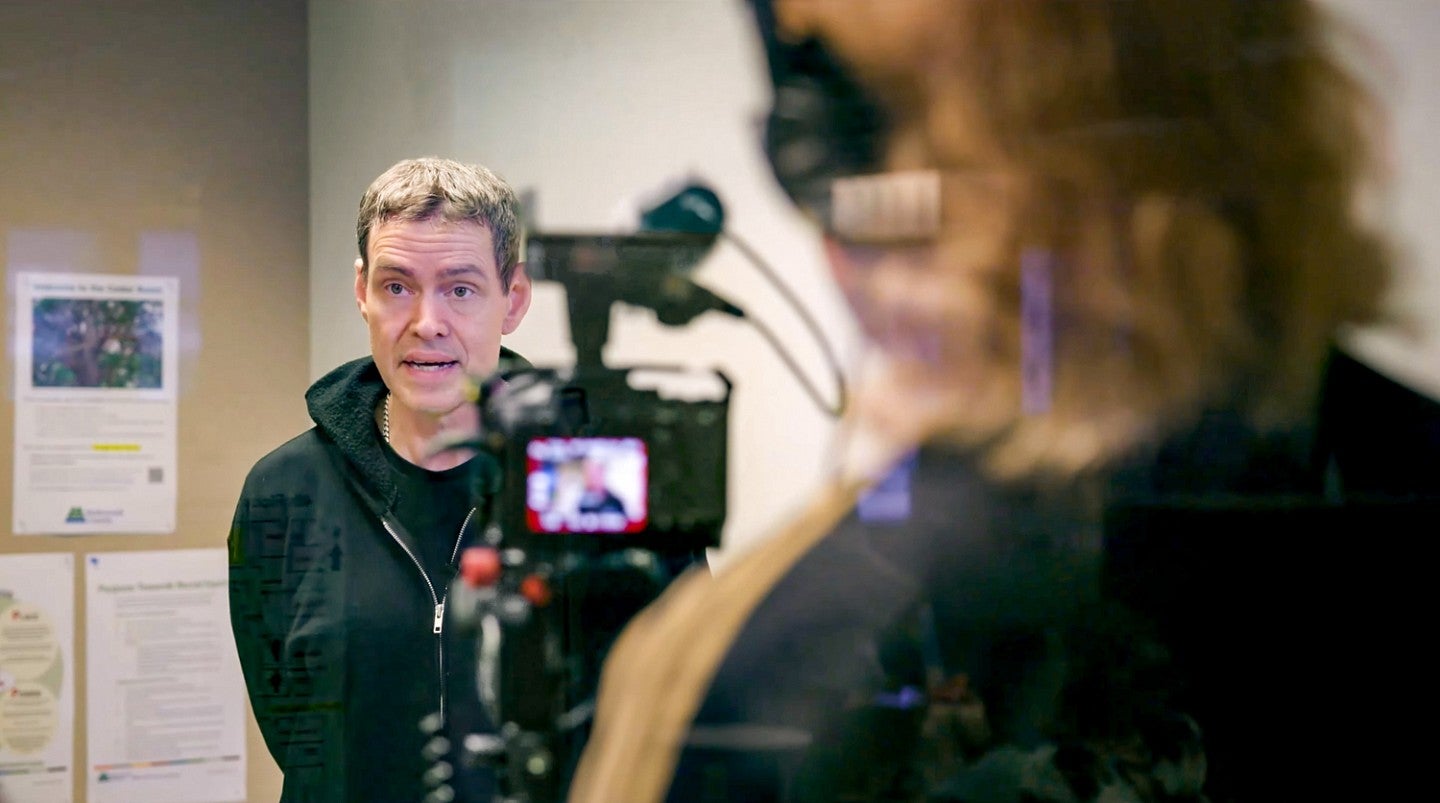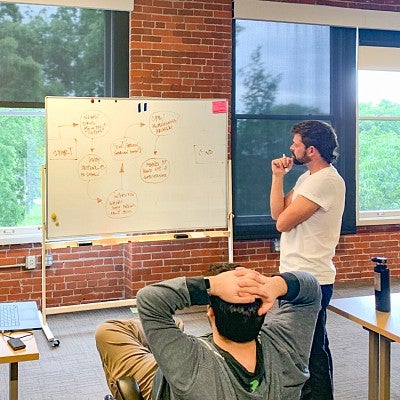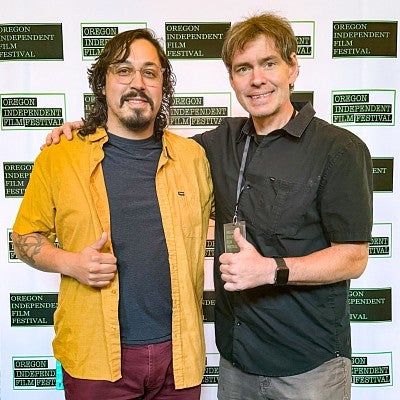An SOJC master’s student turns the story of his recovery from addiction and homelessness into an award-winning film.
By Kelly Clendenon ’25
For my Multimedia Storytelling Master’s terminal project at the UO School of Journalism and Communication (SOJC), I created “Helpers,” a 22-minute documentary that weaves together my deeply personal story of recovering from addiction and homelessness in Portland with the city’s ongoing struggle with fentanyl and housing crises.
The film explores how personal healing and community healing are connected, highlighting the volunteers and organizations working on the front lines. I wanted to show that Portland’s story is not just about suffering but also about resilience.
My recovery journey from the streets in the mid-2010s to co-founding the 13 Salmon Shower Project in 2023 mirrors the city’s efforts to respond to overwhelming challenges. The helpers in the film aren’t just aiding individuals; they’re helping to rebuild the community itself.

Why this story
The decision to tell this story came directly from my lived experience. After surviving the worst of Portland’s addiction crisis, I came to see that my recovery was deeply connected to the city’s own attempts to recover. We’ve both been through trauma, have been written off by outsiders and are still working to rebuild.
Co-founding the 13 Salmon Shower Project—which offers unhoused individuals a free and secure space to shower, rest, get clean clothing and enjoy a warm drink and snack—became the foundation for this work. That hands-on involvement gave me both the access and authenticity I needed to tell these stories ethically.
The idea for the film crystallized when I was invited onto Oregon Pubic Broadcasting’s radio news talk show “Think Out Loud” to discuss the shower project. With permission to film the interview and assistance from my cohort, I realized I had the beginning of something much larger.
Building trust with vulnerable communities
Creating “Helpers” meant thinking carefully about how to represent vulnerable communities. By the time we began filming, I had already been serving as on-site coordinator at the shower project for months. That trust mattered. I wasn’t arriving as an outsider with a camera but as someone who had shown consistent commitment.
The most powerful moments came when people forgot the camera was there and simply shared their reality. Filming at the shower project and around the city required flexibility and sensitivity to people’s needs.

A collaborative approach
The project was collaborative from the beginning. My co-director, J.J. Kirby, worked alongside me throughout production, and fellow student Kyle LaMontagne brought his editing skills and added striking drone footage. The SOJC provided equipment, allowing us to capture two-camera interviews that gave the film a polished, cinema verité style despite our limited budget. SOJC faculty from the Multimedia Storytelling Master’s program, including Wes Pope, Andrew DeVigal and Regina Lawrence, were all very supportive throughout my time at the SOJC.
The music we chose for the film was integral to the vibe we were seeking. With permission from Fugazi’s lead singer, Ian MacKaye, we used the band’s raw, emotional sound to help set the rhythm and tone of the film. We also used some music of a local artist named Keith Richards Lewis at the end of the film.
Organizations like Outside In and First Unitarian Portland opened their doors, while volunteers and guests of the shower project gave feedback on how their stories were presented. One man experiencing homelessness, Flash, offered a perspective that shaped how I told the story. This wasn’t extractive journalism, it was collaborative storytelling.
Recognition for 13 Salmon Shower Project
“Helpers” recently won Best Social Documentary and Best Student Film at the 2025 Oregon Independent Film Festival. That recognition felt deeply validating for everyone who trusted me with their stories.

The film has been screened locally eight times to date, drawing the attention of service providers, city officials and community members. Screenings have already sparked tangible outcomes: more volunteers for the 13 Salmon Shower Project, conversations among journalism students about ethical storytelling and renewed motivation among participants who said they felt truly seen.
Documentary spawns new production company
The success of “Helpers” opened the door to my next project: the founding of Common Lens Films, a nonprofit production company dedicated to producing documentaries that highlight stories and solutions related to Oregon’s addiction and housing crises. My goal is to screen “Helpers” all over Oregon, followed by panel discussions where people talk about these critical issues.
If this film helps communities see what’s possible when ordinary people show up for their neighbors, then it has already succeeded beyond what I imagined when we began the project.
My work continues, and it feels more urgent than ever. Recent cuts to federal funding for critical programs provided by the U.S. Department of Housing and Urban Development have left service providers stretched thin at a time when the need is only growing. Storytelling that highlights solutions matters now more than ever, because communities can’t afford to wait for policy changes alone; we need to see the power of what’s already working and find ways to expand it.
I’m grateful that the SOJC gave me the space and tools to develop my storytelling skills and the support to bring “Helpers” to life. My hope is that future cohorts see what’s possible when journalism combines personal experience with community engagement, and they carry that spirit into their own projects.
Kelly Clendenon began his journey in film and television in Los Angeles during the 1990s. He worked as a freelance videographer in Washington, D.C., throughout the 2000s, covering high-profile events and news stories. After surviving a fentanyl overdose in 2015, Kelly achieved recovery and returned to higher education in 2021, enrolling at Portland State University. He graduated summa cum laude in 2023 as a history major, then earned his Multimedia Storytelling Master’s from the UO School of Journalism and Communication in 2025. Kelly serves on Portland's Homelessness Regional Action Plan (HRAP) Advisory Committee and leads community conversations about supportive housing measures for the Multimedia Storytelling Master’s. His award-winning documentary “Helpers” won Best Social Documentary and Best Student Film at the Oregon Independent Film Festival in September 2025, and he has since founded Common Lens Films, a nonprofit documentary production company creating films that challenge stereotypes and advocate for social justice solutions.
